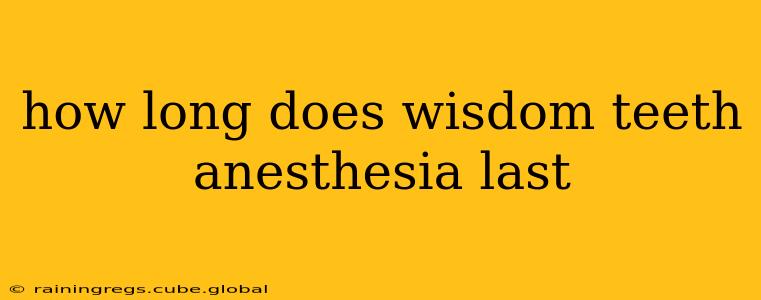Extracting wisdom teeth is a common procedure, and understanding the duration of anesthesia is crucial for post-operative care and recovery. The length of time wisdom teeth anesthesia lasts varies depending on several factors, and knowing what to expect can alleviate anxiety and help you prepare for a smooth recovery.
What Type of Anesthesia is Used for Wisdom Teeth Removal?
Before we delve into the duration, it's important to understand the different types of anesthesia used during wisdom teeth extraction:
- Local Anesthesia: This is the most common type for wisdom teeth removal. A local anesthetic, like lidocaine, is injected directly into the gums and surrounding tissues, numbing the area. The patient remains awake but feels no pain.
- General Anesthesia: This involves putting the patient into a state of unconsciousness. General anesthesia is typically used for more complex extractions or if the patient has anxiety or a low pain tolerance.
- IV Sedation: This is a moderate form of sedation where the patient is relaxed and drowsy but still conscious. The patient is typically given medication through an intravenous line.
How Long Does Local Anesthesia Last for Wisdom Teeth Removal?
The effects of local anesthesia typically last 1-3 hours, though this can vary depending on the type and amount of anesthetic used, as well as individual factors like metabolism. You might still feel some numbness lingering even after the primary effects wear off. This residual numbness can persist for several hours or even a full day.
How Long Does General or IV Sedation Last?
The duration of general anesthesia or IV sedation is significantly longer. The effects of these types of anesthesia usually wear off after several hours, although you may feel drowsy and groggy for a longer period. A responsible adult must accompany you home after this procedure.
How Long Will I Feel Numb After Wisdom Teeth Removal?
The numbness after wisdom teeth removal, irrespective of the type of anesthesia used, can last for several hours or even a day or two. This is due to the lingering effects of the anesthetic and the natural healing process. It's essential to be cautious during this time to avoid biting your cheek or tongue accidentally.
What Happens If the Anesthesia Wears Off Before the Procedure is Finished?
Your oral surgeon will carefully monitor your level of anesthesia throughout the procedure. If the anesthesia starts to wear off before the extraction is complete, they will administer more anesthetic to ensure your comfort and the successful completion of the surgery. This is a rare occurrence with experienced oral surgeons.
What Should I Do If I Still Feel Pain After the Anesthesia Wears Off?
After the anesthesia wears off, you'll likely experience some post-operative pain and discomfort. Your oral surgeon will prescribe pain medication to help manage this. It's crucial to follow their post-operative instructions carefully, including taking prescribed medications as directed and keeping the extraction sites clean.
When Should I Contact My Oral Surgeon?
Contact your oral surgeon immediately if you experience excessive bleeding, severe swelling, persistent numbness beyond a few days, or any other concerning symptoms.
Understanding the duration and potential effects of anesthesia for wisdom teeth removal is a critical part of preparing for the procedure and ensuring a smooth recovery. Remember that every patient's experience is unique, and open communication with your oral surgeon will help you manage any concerns you may have. Always follow your oral surgeon's post-operative instructions to minimize complications and promote healing.
